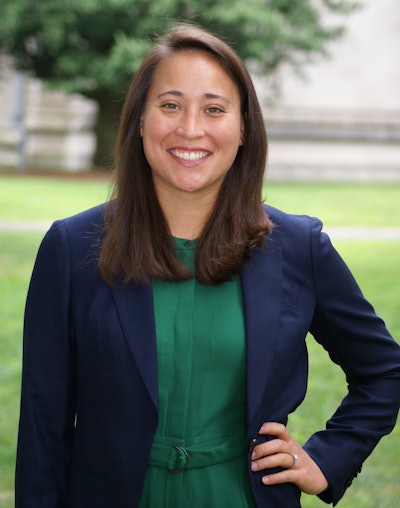My heart is heavy; the muscles in my back and shoulders haven’t relaxed in months. And, if I’m being honest, I’m not sure they’ve relaxed much at all throughout my entire life.
I am, first, a daughter to two loving parents, neither able to finish their college degrees. I have memories of my father, an immigrant from the Philippines, taking computer systems courses at night at the local college. My mother, often working a full-time job and doing part-time contractual work to make the dollars and cents go together, got up even earlier in the morning so she could work a full day and then be at home for my brother and me when the school day ended. They are two of the most creative, thoughtful, and hard-working people I know, and I don’t need a credential to see that.
 Adrienne Amador Oddi
Adrienne Amador OddiI am a new (and young, and female, and biracial) dean of admissions and financial aid at one of the best colleges in the United States. I’ve taken a very different path than the plan (pediatrician then lawyer then professor) and find myself amidst a health pandemic, a social pandemic, and a dramatic decline in applications to college from students who come from families like mine. The irony of sitting at the helm of a division that invites students to apply to college is not lost on me. It’s a poignant reminder that we may all be in the same storm, but we are navigating it in different boats.
So, to the first-generation college students, I am sorry. I am sorry that we did not see you sooner. I am sorry we have not made ourselves accessible. I am sorry that I’ve contributed to missing what you’re experiencing by using language indicating life has slowed down these last few months when the reality of your world is that life has quickened.
Financial pressures are real. Familial responsibilities looming. I have felt them. I feel them. I am a daughter, first.
So, what do we do?
There’s school, and it’s definitely not normal right now. There’s our family’s health and well-being, which is tenuous in the best of times. There’s a job on the table. Our family needs us. We need us.
How do we thread the needle between helping now, helping later, helping always?
My training in selective higher education has taught me that I should simply say, we must prioritize ourselves. It’s the admissions officer equivalent of Put your mask on first before assisting others. I must have seen that video hundreds of times on planes and heard it referenced countless times over the last 8 months.
What a luxury.
Telling you to prioritize yourself is a way for me to alleviate myself of responsibility for the massive decline in college applications from first-generation college students. Telling you to put your mask on first means I don’t have to think too hard about the others whose masks are hanging there waiting. Telling you without seeing all of you, puts the onus of this problem on you.
Not anymore. It is my problem. Not yours. It is the problem of selective higher education. By design, we must say “no” more than we say “yes.” That’s not on you. That’s on us.
Fellow first-geners, I see you, and I celebrate you. If you’re thinking about college, apply. It’s a risk to put yourself out there, to want something different. You can do it. We need you. You belong.
And, to my fellow selective college admissions deans, I am asking for a mindset shift. We must stop being receivers of applications. We started in this work as admissions counselors, taught to counsel students to find the right path. Somewhere along the way to our seats at the top, we got complacent. We got comfortable. It didn’t happen overnight, but it happened. We stopped counseling and started receiving.
And just as surely as we lost our way from counseling, we can find it again. We can examine our practices and ask ourselves – Who is here? Who is missing? As Maya Angelou cautioned, when we know better, we can do better. We must create new practices that intentionally include different voices and views. We must be willing to push ourselves outside of the familiar just as we are asking of prospective students. We must create communities that celebrate students for who they are and where they are from. This is the soul’s work, and it’s our responsibility to nurture the souls of our institutions. It’s our turn to act. Choose reaching out and inviting in over waiting. Who is with me?
Adrienne Amador Oddi is dean of admission and financial aid at Trinity College in Hartford, CT.


















